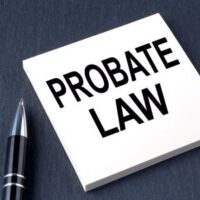Ancillary Probate Administration in Florida

Florida is one of the most popular places in the country to retire. The favorable tax laws and absence of harsh winters draw people from all walks of life, and many own properties in more than one state. Vacation homes and seasonal condos are amazing investment opportunities that many retirees take advantage of, while also residing in another home outside of the state. When someone passes away who does own assets in Florida but lives in another state, Florida law determines how the Florida assets are administered. Called “ancillary probate” this procedure for property ownership transfer is important to understand.
Ancillary Probate
The term “ancillary probate” refers to Florida’s statutory process for transferring ownership of Florida-owned assets when the decedent owner primarily lived out of state. Most often, an ancillary probate administration process will begin in the decedent’s home state – the state that the decedent held residency. A secondary probate proceeding will then be commenced in whatever Florida county the decedent’s property is located.
Once an estate executor or personal representative has been appointed by the Court in the decedent’s home state, the executor/personal representative can petition the Florida Court for authority to also act as the personal representative over the ancillary process in Florida.
Florida courts maintain jurisdiction over Florida matters. This means that even if an estate executor or personal representative has been appointed to carry out duties in the administration of a decedent’s estate in that person’s home state – that person does not automatically have the authority to administer the estate in Florida. Florida law will govern the administration of assets in Florida. Lets say, for example, that a person who lives in New Jersey owns a winter home in the Florida Keys. If that person passes away and a probate administration is taking place in New Jersey – the administration of the Florida property must be a separate process undertaken in Florida, and subject to Florida probate laws, rules, and procedures.
What is the Point of an Ancillary Administration?
The purpose of a Florida ancillary probate administration is to collect the assets owned in Florida by nonresident decedents and to remit the proceeds to the domiciliary executor or personal representative. The “domiciliary estate” is the estate established in a decedent’s home state, while an “ancillary estate” is the estate that must be created to account for assets outside of that domiciliary estate, in Florida.
Under the Florida Probate Code, Florida Statute 734.102, if a nonresident of Florida dies while owning assets in Florida, a personal representative named in the decedent’s last will and testament can be entitled to have ancillary letters issued, as long as the appointed party is qualified to act in Florida.
How to Commence Ancillary Probate Administration in Florida
Florida probate rule 5.470, states that a petition for ancillary letters must include an authenticated copy of the domiciliary proceedings that shows:
(1) for a testate estate: the last will and testament, petition for probate, court order admitting the last will and testament into probate, and proof of authority of the personal representative;
(2) for an intestate estate: the petition for administration and authority of the personal representative to act.
There is a lot of nuance and several steps an executor/personal representative must take – consult with an experienced wills & probate attorney for formal guidance.
Contact Suncoast Civil Law
The respected Sarasota wills & probate attorneys at Suncoast Civil Law can help you navigate through any ancillary probate issue. Contact our office today to begin speaking with our team.
Sources:
casetext.com/rule/florida-court-rules/florida-probate-rules/part-ii-probate/rule-5470-ancillary-administration
flsenate.gov/Laws/Statutes/2012/734.102
